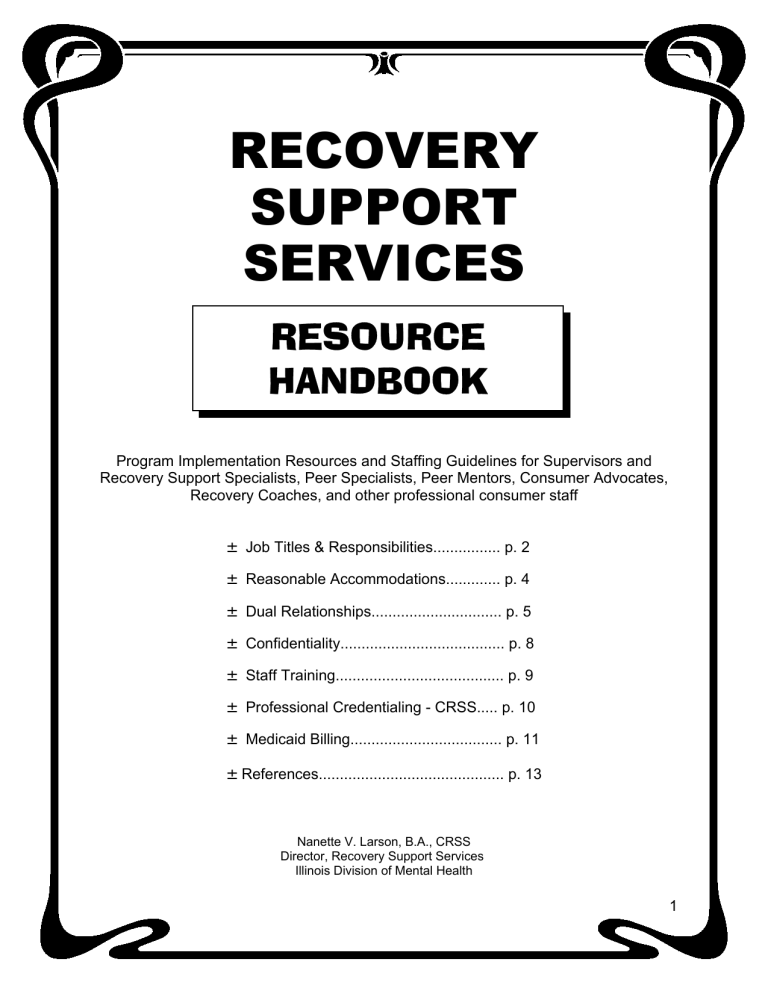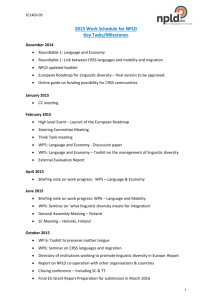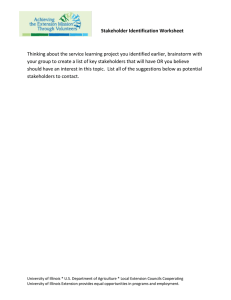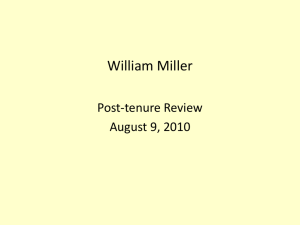G:\NrthCntrlNtwrk\Nanette\W R A P\W n W Binder\III - p1

RECOVERY
SUPPORT
SERVICES
RESOURCE
HANDBOOK
Program Implementation Resources and Staffing Guidelines for Supervisors and
Recovery Support Specialists, Peer Specialists, Peer Mentors, Consumer Advocates,
Recovery Coaches, and other professional consumer staff
Job Titles & Responsibilities................ p. 2
Reasonable Accommodations............. p. 4
Dual Relationships............................... p. 5
Confidentiality....................................... p. 8
Staff Training........................................ p. 9
Professional Credentialing - CRSS..... p. 10
Medicaid Billing.................................... p. 11
References............................................ p. 13
Nanette V. Larson, B.A., CRSS
Director, Recovery Support Services
Illinois Division of Mental Health
1
Recovery Support Services Resource Handbook Rev. 03/09
JOB TITLES AND RESPONSIBILITIES
One of the most common mistakes make by mental health agencies is hiring consumers simply to hire consumers, without thinking through exactly what their role will be, how their performance will be assessed, or how their position will relate to existing staff. Agency executives should consider the following questions and action steps when making the decision to develop positions specifically designed for persons with psychiatric disabilities.
I.
II.
WHAT WILL THE JOB TITLE BE?
A.
Keep in mind that the position title should, above all else, communicate to persons served at the agency the role that the person in the position fills.
B.
Remember also that two persons who perform distinctly different job functions should have separate and distinct job titles, regardless of whether or not the qualifications for the positions are the same. These separate job titles help persons served at the agency to differentiate the role of the two individuals.
C.
1.
2.
3.
4.
5.
6.
The following is a list of examples of job titles which have been used for positions distinctly designed to be filled by qualified individuals with personal mental health experience:
Director of Recovery Support Services
Peer Mentor; Peer Specialist; Peer Advocate
Consumer Advocate; Recovery Advocate
Engagement Specialist; Recovery Specialist; Consumer Specialist
Case Management Aide; Peer Support Specialist
Recovery Manager
These are in addition to any other positions which may be filled by qualified individuals with personal mental health experience within the agency, but which do not require such to qualify for the position,
WHAT WILL THE POSITION RESPONSIBILITIES BE?
A.
First and foremost, be certain to adequately define the consumer employee’s job duties. Design a clear and comprehensive job description and hire a qualified individual to fill the position.
B.
Examples of responsibilities for consumer-specific positions:
1.
2.
3.
4.
Conduct training for new and current employees
Review and participate in development, revision, amendment to agency policies and procedures
Lead/co-lead peer support groups
Facilitate Wellness Recovery Action Planning (WRAP) Classes
2
Nanette V. Larson, BA, CRSS; Director, Recovery Support Services - Illinois DMH
Recovery Support Services Resource Handbook
5.
6.
Rev. 03/09
Conduct Consumer Satisfaction Surveys
Advocate for individual consumers and family members as needed
III. WHAT WILL THE REQUIREMENTS FOR THE POSITION BE?
A.
Determine what other requirements will be set for this individual to be qualified for the position, in addition to having personal mental health experience. “Consumer” alone as a qualification is tokenism, and is unacceptable.
B.
Qualifications can be based on education/experience or based on competencies.
Ideally, qualifications for the position are a combination of both.
C.
D.
Examples of qualifications based on education/experience:
1.
2.
Requires the skills, knowledge and abilities equivalent to the completion of four years of college with a degree in either social work, psychology, or other related health or human services field.
Requires 2 years of related work and/or volunteer experience.
Examples of qualifications based on competencies:
1.
2.
3.
4.
5.
6.
Has good judgement.
Sees life experience as an asset.
Has ability to work as part of a team.
Demonstrates the courage to challenge and confront.
Is flexible, able to change priorities.
Has excellent communication skills.
IV.
WHERE IN THE SYSTEM WILL THE POSITION BE ASSIGNED?
A.
If not directly supervised by executive management, these individuals should have a formal and direct link to executive management, in order to aid in the transformation of the overall system.
B.
Initially, assign consumer staff to the areas in which they are most likely to be welcomed. This creates a positive climate for the beginning of overall systems change within the organization.
C.
D.
When filling more than one position, consider placing consumer staff together.
Individuals may be more likely to speak up against out-dated modes of thinking or acting if they have one another’s support.
Assign the new hires to work under the direction of your best supervisors. Many consumer staff have reported that the support and guidance they did or did not receive from their supervisors made all the difference in their success on the job.
Nanette V. Larson, BA, CRSS; Director, Recovery Support Services - Illinois DMH
3
Recovery Support Services Resource Handbook
V. WILL THERE BE OPPORTUNITIES FOR ADVANCEMENT?
A.
B.
C.
Rev. 03/09
One pitfall of creating consumer-specific jobs is that there often is no career path to more advanced and more highly compensated positions.
Consider whether the positions designated for the proactive recruitment of consumer staff provide opportunities for advancement.
Ensure that the career path is at least comparable to that of other entry-level staff.
I.
II.
4
REASONABLE ACCOMMODATIONS
WHAT DO I NEED TO KNOW ABOUT THE ADA?
A.
B.
C.
D.
E.
The Americans with Disabilities Act (ADA) is a law that was passed to protect citizens with disabilities. Psychiatric conditions qualify as “disabilities” under this
Act.
According to the ADA, employers may not ask job applicants about the existence, nature, or severity of a disability.
According to the ADA, employers may not inquire as to whether a job applicant has ever received mental health treatment, either verbally or through written application questions.
According to the ADA, employers cannot require a medical examination prior to making an offer of employment.
According to the ADA, employers must make reasonable accommodations for applicants and employees with disabilities who request them, unless doing so would impose an undue hardship on the business.
WHAT DO I NEED TO KNOW ABOUT REASONABLE ACCOMMODATIONS?
A.
A reasonable accommodation is any agreed upon change in a particular workplace environment, or in the way things are usually done, that makes it possible for a person with a disability to do the job.
B.
C.
The first step an employee with a disability, including a mental illness, must take to request a reasonable accommodation is to disclose his/her disability. It is up to the employee to reveal this information.
The second step is to make the request. Again, it is the employee’s responsibility to do so. The employer does not have to suggest or offer an accommodation if no request has been made. It is recommended that the employee make the request early in employment, in anticipation of need, rather than later or in a state of crisis.
Nanette V. Larson, BA, CRSS; Director, Recovery Support Services - Illinois DMH
Recovery Support Services Resource Handbook
D.
Rev. 03/09
Generally, the employee with the disability is in the best position to suggest needed accommodations. Discussion should focus on the individual’s particular abilities and limitations as they pertain to the essential functions of the job, and should include an evaluation of how an accommodation might overcome barriers to performance.
E.
An employer has the right to deny a requested accommodation if it would place
“undue hardship” on the organization. “Undue hardship” is defined as an “action requiring significant difficulty or expense.”
F.
An employee has the right to deny any accommodation which he/she has not requested or which he/she believes is not necessary.
DUAL RELATIONSHIPS
ROLE CLARIFICATION & BOUNDARY ISSUES
Role confusion and the damage it does to both parties in the relationship has been identified as the number one obstacle to consumer staff being successfully integrated and accepted into the provider workforce.
I.
ROLE CLARIFICATION
A.
Clear job descriptions and expectations are key to success. When the consumer staff is unclear about his/her role, others will be as well.
B.
C.
D.
E.
F.
Communicate the role of the consumer staff clearly and broadly, among other agency staff and persons served.
Provide adequate training and mentorship opportunities. While there are certain assets consumer staff bring to the job, from their own personal experiences, practical skills that one learns through education and work experience are also essential for success on the job.
Keep in mind that the consumer, now staff, is the one who is experiencing the greatest impact of this transition. Provide direction, support and supervision to help the individual make this transition.
Consumer staff may feel that they are in “no man’s land,” as consumers begin to see them as staff and staff still see them as consumers.
Consider establishing a network of support within your organization for staff members who have histories of psychiatric disability, disclosed or undisclosed.
Encourage, and allow time for, consumer staff to be involved with other networks of consumer staff (within the agency, region or on a state or national level).
Nanette V. Larson, BA, CRSS; Director, Recovery Support Services - Illinois DMH
5
II.
Recovery Support Services Resource Handbook
THE SUPERVISORY RELATIONSHIP
A.
Rev. 03/09
An individual cannot be a supervisor and a mental health provider to the same person. If an employee is asking for support that feels like it is beyond the boundaries of the supervisory relationship, point this out and work with the individual to identify other people he/she might turn to for support.
B.
C.
Among supervisors in the mental health field, there is an inclination to bring one’s clinical training into the supervisory relationship. This is even more likely to happen when the employee is a former mental health consumer. Supervisors must be prepared to establish helpful positive boundaries.
Keep the focus of supervision on the job. What needs to be accomplished? What is the best way to get the work done? Is any support needed to perform work tasks?
D.
As with the supervisory relationship, it is equally important that supportive relationships between co-workers not develop into a therapist-client dynamic, and that consumer staff not overly rely on their co-workers for support. Refer the individual to EAP services, as with any other employee, when and if appropriate.
III.
INTERPERSONAL INTERACTIONS BETWEEN STAFF & CONSUMERS
A.
POLICY QUESTIONS TO CONSIDER:
Agencies seeking to promote staff development which includes hiring persons in recovery should first carefully consider the following questions.
1.
What are our agency’s current policies concerning relationships between staff and consumers, ‘fraternization,’ and ‘conflict of interest?’
2.
Are the agency’s policies still relevant and sufficient to address present-day situations? Do we need to consider policy revisions that are more reflective of the agency’s commitment to hiring current or former consumers of services?
3.
4.
How can our policies uphold vital underlying values, which protect consumers from employees who may abuse the power imbalance inherent in the staffclient relationship, while also appropriately redefining boundaries which are more suitable for modern circumstances?
If our agency holds policies which prohibit employees from engaging in social relationships with consumers, and our agency chooses to hire a current consumer, are we prepared to notify that individual that he/she cannot have social relationships with ANY person (staff or consumer) associated with our agency??? What impact might this have on the individual’s overall mental health recovery?
6
Nanette V. Larson, BA, CRSS; Director, Recovery Support Services - Illinois DMH
Recovery Support Services Resource Handbook
5.
Rev. 03/09
What is the clinical justification for our policy? Is there clinical justification for a change in policy or for a case-by-case exception to the policy?
B.
6.
How do our policies protect our consumers, staff and consumer providers?
Are there other, less problematic, ways of achieving the same outcome?
POSSIBLE ACTIONS TO CONSIDER:
Having considered the questions above, the agency will then need to more actively engage in some or all of the following action steps.
1.
Brainstorm possible dual role situations in social relationships between staff and clients.
2.
Keep in mind that incoming employees may have established social, sexual, or financial relationships with other consumers. How would these be handled differently than new relationships? Is there a current policy for non-consumer staff that is equally applicable for consumer staff?
C.
3.
4.
Differentiate between consumer-consumer relationships that existed prior to the employment situation from those that are initiated in the context of a professional helping relationship.
Involve staff, managers and consumers in establishing policy guidelines and principles for application on a case-by-case basis.
POLICY DEVELOPMENT:
The key to success is clearly written policies with a standard for case-by-case application fo the policy.
It is possible to design a policy in which you document the underlying principles, but largely relegate the application of the policy/principles to a case-by-case analysis.
An example of such a procedure, this on sexual relations, is as follows:
“In order to protect the department’s clients from abuse associated with the imbalance of power between clients and staff, staff may neither initiate nor maintain romantic and/or sexual relationships with clients the department presently serves, nor those recently closed within the past two years.
Employees recently hired with prior such relationships must promptly report these to their manager, who will work with the
Clinical Deputy, for case by case resolution. Resolution will be guided by County Counsel and the Department Director’s discretion. Staff are expected to exercise good judgement and to act in the best interest of the clients at all times.”
Nanette V. Larson, BA, CRSS; Director, Recovery Support Services - Illinois DMH
7
Recovery Support Services Resource Handbook Rev. 03/09
Santa Barbara County Policies and Procedures on Ethical, Professional,
Responsible and Productive Staff Conduct.
This policy sets a general guideline, but allows for exceptions with proper review.
CONFIDENTIALITY
Confidentiality questions arise primarily when hiring consumers who have been or are being served by the provider agency.
I.
WILL CONSUMER STAFF HAVE ACCESS TO CLIENT FILES?
A.
All new employees should be informed of their duty to uphold confidentiality and required to sign a confidentiality agreement, whether they are consumers or nonconsumers.
B.
C.
D.
As a general rule, the decision about whether employees who are also consumers will do charting should depend on their role . Require charting if it is customary for others in this job classification. Require charting if this person’s contact with agency consumers would seem to necessitate it.
Avoid charting on self-help or 12-step activities (by consumer or non-consumer staff), as to have one member taking notes and charting others’ comments typically violates the equality and anonymity assumed by participants of such activities.
There may be situations in which it is appropriate to limit access, e.g., limiting access to the charts of other group therapy members by the consumer employee who continues to take part in a particular group.
II.
WHAT ABOUT PROTECTING THE CONFIDENTIALITY OF THE CONSUMER WHO HAS
BEEN HIRED?
A.
B.
C.
Sequester the charts of employees who are current or former recipients of services
(this is a wise precautionary measure any time an employee, employee’s close relative, a public figure, or a relative of a public figure receives services from the agency).
Consumer employees’ records can be maintained under pseudonyms, with a list matching client numbers with actual names kept in the Director’s office.
Consider other ways in which the confidentiality of employees who are also consumers could be compromised and take appropriate steps to prevent problems.
8
Nanette V. Larson, BA, CRSS; Director, Recovery Support Services - Illinois DMH
I.
II.
Recovery Support Services Resource Handbook
STAFF TRAINING
Rev. 03/09
WHAT NEW AREAS OF TRAINING NEED BE CONSIDERED FOR OUR STAFF AS WE
PREPARE TO BRING CONSUMERS ON BOARD AS EMPLOYEES?
A.
B.
Teach the vision. Current and new employees will need be educated as to why the agency has made the decision to hire consumers. Make clear to staff what the vision is and what the expected outcomes are. What is the purpose behind this new move?
Teach the power of language. Language is most often used thoughtlessly, sometimes maliciously. Mental health agencies need make a concerted effort to educate their staff about how to speak respectfully about persons with mental illnesses. (This should be done whether or not you have consumers on staff!) This includes teaching all employees about the use of “person-first language.”
C.
2.
3.
Prepare staff to handle the possibility of periods of illness appropriately. This is one of the primary concerns expressed by mental health staff regarding consumer coworkers. “What if he/she gets sick?” As the individual returns to work:
1.
4.
Treat him/her like you would anyone who has been absent from work. Let them know you missed having them around and are glad they are back.
Do not treat them as if they are fragile or need to be coddled. Talk to them like you would normally.
Update them on any changes, or lack of changes, that occurred since they have been gone. Re-orient them to the work.
Give them time to ease back into their responsibilities, if they request such accommodations.
ARE THERE SPECIAL AREAS OF TRAINING THAT NEED BE CONSIDERED FOR
CONSUMER EMPLOYEES?
A.
B.
Be certain to provide plenty of training in practical skills that one typically learns through education and work experience. Do not assume that the person’s life experience is all that is needed to qualify to work with other persons with mental health challenges.
Be certain to address issues related to boundaries and role conflicts that may arise due to the uniqueness of their position. This tends to be most commonly expressed by consumer staff as the most challenging aspect of their work.
PROFESSIONAL CREDENTIALING - CRSS
The Illinois Certification Board (ICB) maintains competency based professional certification programs. In collaboration with the ICB, a valid, reliable, and defensible methodology has
Nanette V. Larson, BA, CRSS; Director, Recovery Support Services - Illinois DMH
9
Recovery Support Services Resource Handbook Rev. 03/09 been established to assure that an individual meets an acceptable standard of competency, in terms of knowledge and skills, for the profession of Certified Recovery Support Specialist
(CRSS).
I.
WHAT IS CRSS?
A.
CRSS stands for Certified Recovery Support Specialist.
B.
C.
D.
CRSS is a credential for people who provide professional peer services for persons in recovery from mental illness or mental illness/substance use disorders.
A CRSS is a professional trained to incorporate his/her unique personal experiences in recovery, into their work in mental health, rehabilitation, or substance abuse services, to support others with similar conditions.
CRSS professionals must meet an acceptable minimum standard of competency, in terms of knowledge and skills, to provide the unique function of mental health or MISA peer support.
II.
HOW DOES A PERSON OBTAIN THE CERTIFIED RECOVERY SUPPORT
SPECIALIST (CRSS) CREDENTIAL?
A.
Complete and submit an application for CRSS to the Illinois Certification Board
(also known as IAODAPCA). The “Illinois Model for Mental Health Certified
Recovery Support Specialist” outlines the requirements for the credential, and includes an application.
B.
This document is available for download at www.iaodapca.org/forms/
III.
WHAT ARE THE REQUIREMENTS FOR THE CERTIFIED RECOVERY SUPPORT
SPECIALIST (CRSS) CREDENTIAL?
A.
B.
Minimum high school diploma or GED;
2,000 hours (one year) paid/supervised work experience;
C.
100 hours supervision in the CRSS performance domains;
D.
E.
100 hours training/education related to CRSS domains, professional ethics and responsibility, and other core functions;
Successful completion of a written exam for CRSS.
10
Nanette V. Larson, BA, CRSS; Director, Recovery Support Services - Illinois DMH
Recovery Support Services Resource Handbook
IV.
WHAT ARE THE CRSS PERFORMANCE DOMAINS?
A.
Advocacy
B.
C.
Professional Responsibility
Mentoring
Rev. 03/09
V.
A.
B.
D.
Recovery Support
WHAT DOES IT COST TO OBTAIN THE CERTIFIED RECOVERY SUPPORT
SPECIALIST (CRSS) CREDENTIAL?
The application fee is $75.00. The examination fee is $125.
The annual renewal fee is $60.00.
VI.
WHAT IS THE DIFFERENCE BETWEEN THE PRCP AND THE CRSS?
A.
B.
In order to obtain the CRSS, a candidate must be a person who is or was formerly a consumer of mental health or MISA services. For a PRCP (Psychiatric
Rehabilitation Certificate Program) certificate, any interested individual may complete the course-work and obtain the certificate.
The PRCP is a curriculum-based certificate program. There is no additional experience requirement beyond the completion of the course-work. The CRSS is a competency-based credential. In order to achieve this type of credential, a combination of training, work experience, and satisfactory completion of an exam are required.
I.
MEDICAID BILLING
WHAT RULE 132 SERVICE CODE IS USED TO BILL BY CONSUMER STAFF or CRSS or FOR PEER SUPPORT SERVICES?
A.
B.
No unique service definition or billing code exists for peer support services. This is due to the fact that peer support can and should be provided in conjunction with all comprehensive community mental health services.
Examples of services in which peer support can be billed for when provided by consumer staff include Community Support, PSR, ACT, Outreach and Engagement,
Vocational Engagement, Job Finding Supports, Job Retention Supports, Job
Leaving/Termination Supports.
Nanette V. Larson, BA, CRSS; Director, Recovery Support Services - Illinois DMH
11
II.
Recovery Support Services Resource Handbook
WHAT ARE THE QUALIFICATIONS REQUIRED FOR BILLING?
A.
B.
Rev. 03/09
RSA (Rehabilitative Services Associate): An individual who is 21 years of age; have demonstrated skills in the field; have demonstrated ability to work within the agency’s structure, and work constructively with clients, treatment resources and the community.
MHP (Mental Health Professional): An individual who provides services under the supervision of a qualified mental health professional and who possesses: a bachelor's degree; a practical nurse license under the Nurse Practice Act; a certificate of psychiatric rehabilitation from a DHS-approved program plus a high school diploma plus 2 years experience in providing mental health services; a recovery support specialist certified and in good standing with the Illinois
Alcohol and Other Drug Abuse Professional Certification Association, Inc., plus one year experience in providing mental health services; an occupational therapy assistant licensed under the Illinois Occupational Therapy Practice Act [225
ILCS 75] with at least one year of experience in a mental health setting; or a minimum of 5 years supervised experience in mental health or human services . A supervised internship in a mental health setting counts toward the experience in providing mental health services. Any individual meeting the minimum credentials for an LPHA or QMHP under this Part is deemed to also meet the credentialing requirements of an MHP.
12
Nanette V. Larson, BA, CRSS; Director, Recovery Support Services - Illinois DMH
Recovery Support Services Resource Handbook
REFERENCES
Rev. 03/09
Illinois Department of Human Services/Division of Mental Health. Medicaid Information.
Www.dhs.state.il.us/mhdd/mh/
Illinois Model for Mental Health Certified Recovery Support Specialist (CRSS).
Illinois Certification
Board d/b/a IAODAPCA., Inc. 2007. Www.iaodapca.org
Matrix Research Institute Developing a State Vision for Employment Services for Persons with
Psychiatric Disabilities.
National Association of State Mental Health Program Directors/National
Technical Assistance Center for State Mental Health Planning. 1999.
Matrix Research Institute . Technical Assistance Toolkit on Employment for People with
Psychiatric Disabilities.
National Association of State Mental Health Program Directors/National
Technical Assistance Center for State Mental Health Planning. 1999.
Meaningful Participation. Consumers Serving on Advisory Boards. The Center for Healthcare
Strategies. Princeton, New Jersey.
Mental Health Recovery: What Helps and What Hinders? A National Research Project for the
Development of Recovery Facilitating System Performance Indicators.
National Association of
State Mental Health Program Directors/National Technical Assistance Center for State Mental
Health Planning. 2002.
Participatory Dialogues. A Guide to Organizing Interactive Discussions on Mental Health Issues among Consumers, Providers, and Family Members.
U.S. Department of Health and Human
Services / Substance Abuse and Mental Health Services Administration / Center for Metal Health
Services. 2000.
Shore, S.E. and Curtis, L.C. Managing Workplace Conflict: A Skills Training Workbook for Mental
Health Consumers and Supervisors. University of Illinois at Chicago, National Research &
Training Center on Psychiatric Disability. 1997.
Solomon, Jonikas, Cook, & Kerouac. Positive Partnerships. How Consumers and NonConsumers
Can Work Together as Service Providers. 2 nd Edition. University of Illinois at Chicago, National
Research & Training Center on Psychiatric Disability. 1998.
Nanette V. Larson, BA, CRSS; Director, Recovery Support Services - Illinois DMH
13



